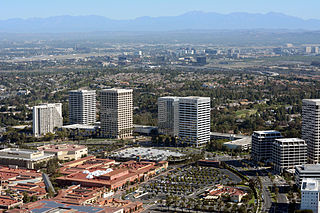
Fashion Island is an outdoor regional shopping mall in Newport Beach, California. Opened in 1967 by The Irvine Company as the anchor to their master-planned Newport Center district, Fashion Island is anchored by Bloomingdale's, Macy's, Neiman Marcus, and Nordstrom.

The Biltmore Fashion Park is an outdoor retail and dining mall located in the Biltmore District of Phoenix, Arizona, along East Camelback Rd. The Biltmore Fashion Park, as well as the surrounding business and residential district, is named after the historic Arizona Biltmore Hotel nearby.
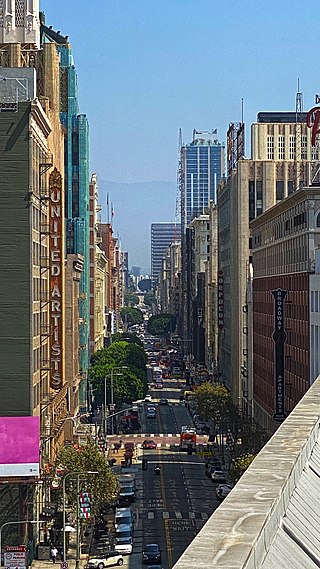
Broadway, until 1890 Fort Street, is a thoroughfare in Los Angeles County, California, United States. The portion of Broadway from 3rd to 9th streets, in the Historic Core of Downtown Los Angeles, was the city's main commercial street from the 1910s until World War II, and is the location of the Broadway Theater and Commercial District, the first and largest historic theater district listed on the National Register of Historic Places (NRHP). With twelve movie palaces located along a six-block stretch of Broadway, it is the only large concentration of movie palaces left in the United States.
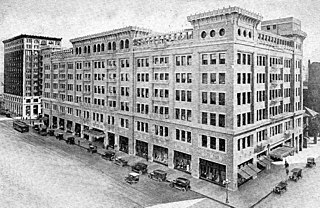
J. W. Robinson Co., Robinson's, was a chain of department stores operating in the Southern California and Arizona area, previously with headquarters in Los Angeles, California.

Bullock's was a chain of full-line department stores from 1907 through 1995, headquartered in Los Angeles, growing to operate across California, Arizona and Nevada. Bullock's also operated as many as seven more upscale Bullocks Wilshire specialty department stores across Southern California. Many former Bullock's locations continue to operate today as Macy's.
I. Magnin & Company was a San Francisco, California-based high fashion and specialty goods luxury department store. Over the course of its existence, it expanded across the West into Southern California and the adjoining states of Arizona, Oregon, and Washington. In the 1970s, under Federated Department Stores ownership, the chain entered the Chicago, and Washington, D.C., metropolitan areas. Mary Ann Magnin founded the company in 1876 and named the chain after her husband Isaac.
The Broadway was a mid-level department store chain headquartered in Los Angeles, California. Founded in 1896 by English-born Arthur Letts Sr., and named after what was once the city's main shopping street, the Broadway became a dominant retailer in Southern California and the Southwest. Its fortunes eventually declined, and Federated Department Stores bought the chain in 1995. In 1996, Broadway stores were either closed or converted into Macy's and Bloomingdales, some of which were sold and converted to Sears, including the Stonewood Center and Whittwood Town Center locations.

May Company California was an American chain of department stores operating in Southern California and Nevada, with headquarters at its flagship Downtown Los Angeles store until 1983 when it moved them to North Hollywood. It was a subsidiary of May Department Stores and merged with May's other Southern California subsidiary, J. W. Robinson's, in 1993 to form Robinsons-May.

The Shoppes at Carlsbad is a shopping mall in Carlsbad, California. The mall was originally named Plaza Camino Real when it was built in 1969, but was rebranded several times when it was a Westfield Holdings property (1994-2015). Its anchor stores are JCPenney and Macy's. A Robinsons-May closed in 2006, while Sears closed on December 15, 2019.

Fashion Valley is an upscale, open-air shopping mall in Mission Valley in San Diego, California. The shopping center hosts 1,720,533 sq ft (159,842.7 m2) of leasable floor area, making it the largest mall in San Diego and one of the largest in California. It is managed by the 50% owner Simon Property Group.
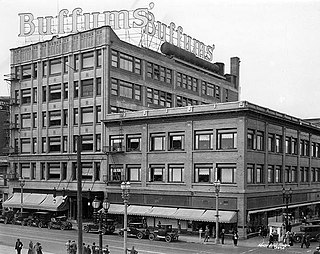
Buffums, originally written as Buffums' with an apostrophe, was a chain of upscale department stores, headquartered in Long Beach, California. The Buffums chain began in 1904, when two brothers from Illinois, Charles and Edwin Buffum, together with other partners, bought the Schilling Bros., the largest dry goods store in Long Beach, and renamed it The Mercantile Co. The store grew to a large downtown department store, and starting in the 1950s, grew slowly over the years to be a small regional chain of 16 speciality department stores across Southern California at the time of its closure in 1990.

The Joseph Magnin Company was a high-end specialty department store founded in San Francisco, California, by Joseph Magnin, 4th son of Isaac Magnin founder of the I. Magnin department store. Joseph Magnin Co. and I. Magnin Co. were rivals.

Desmond's was a Los Angeles–based department store, during its existence second only to Harris & Frank as the oldest Los Angeles retail chain, founded in 1862 as a hat shop by Daniel Desmond near the Los Angeles Plaza. The chain as a whole went out of business in 1981 but Desmond's, Inc. continued as a company that went in to other chains to liquidate them. Desmond's stores in Northridge and West Covina were liquidated only in 1986 and survived in Palm Springs into the first years of the 21st century.

Harris & Frank was a clothing retailer and major chain in the history of retail in Southern California, which at its peak had around 40 stores across Southern California and in neighboring states and regions. Its history dates back to a clothing store founded by Leopold Harris in Los Angeles in 1856 near the city's central plaza, only eight years after the city had passed from Mexican to American control. Herman W. Frank joined Harris in partnership 32 years later in 1888.
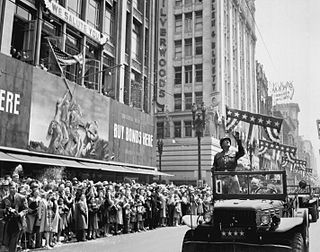
Mullen & Bluett was a Los Angeles-based department store specializing in men's clothing.

Myer Siegel was a Los Angeles–based department store, founded by Myer Siegel (1866–1934), specializing in women's clothing.

7th Street is a street in Los Angeles, California running from S. Norton Ave in Mid-Wilshire through Downtown Los Angeles. It goes all the way to the eastern city limits at Indiana Ave., and the border between Boyle Heights, Los Angeles and East Los Angeles.
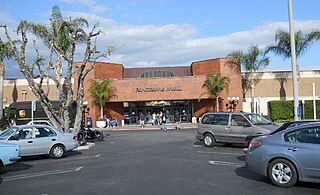
Panorama Mall is a mall in Panorama City, San Fernando Valley, Los Angeles, California. It is an enclosed mall anchored by two large discount stores, Walmart and Curacao, aimed primarily at a Hispanic customer base.

Parmelee-Dohrmann was a Los Angeles–based chain of stores that sold fine china, crystal, glassware, silver, and objects of art.

Retail in Southern California dates back to its first dry goods store that Jonathan Temple opened in 1827 on Calle Principal, when Los Angeles was still a Mexican village. After the American conquest, as the pueblo grew into a small town surpassing 4,000 population in 1860, dry goods stores continued to open, including the forerunners of what would be local chains. Larger retailers moved progressively further south to the 1880s-1890s Central Business District, which was later razed to become the Civic Center. Starting in the mid-1890s, major stores moved ever southward, first onto Broadway around 3rd, then starting in 1905 to Broadway between 4th and 9th, then starting in 1915 westward onto West Seventh Street up to Figueroa. For half a century Broadway and Seventh streets together formed one of America's largest and busiest downtown shopping districts.


















